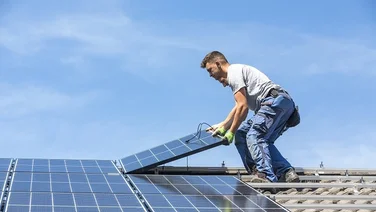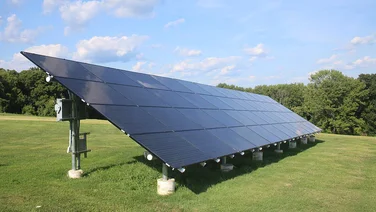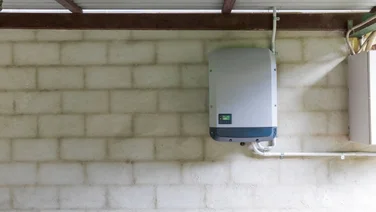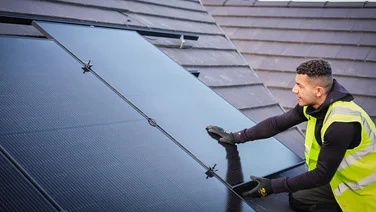We receive a small fee from trusted installers when you request a quote through our site. This helps us keep our content independent, well-researched and up to date – Learn more
- Do solar panels increase the value of your property?
- Is it easier to sell my house if it has solar panels?
- How do I promote my solar panels to potential buyers?
- Should you consider a climate change survey?
- Why do solar panels increase property value?
- Other factors to consider
- Pros and cons of selling a home with solar panels
- Summary
- Solar panels could increase the value of a home by 14%
- Consider a climate change survey when selling your home
- If you’re worried, talk to your mortgage advisor
Solar panels are a long-term investment, but they offer huge benefits, including increasing the value of your home. They can also cut your energy bills by up to £310 a year or more, depending on your system, as well as help fight climate change and reduce your reliance on the National Grid.
What’s more, the cost of solar panels is falling. In fact, according to the latest data from the MCS Dashboard, they are £7,410 on average, as of June 2025.
Research suggests they won’t impact your ability to sell your home, and could, in fact, help you sell it. We’ll get into the specifics below, but if you’re worried about solar panels impacting the value of your home, talk to your mortgage advisor.
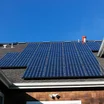
Install solar panels
If you're thinking of installing solar panels, but don't know where to start, we can help. Use the link below and we'll put you in touch with our trusted suppliers who will provide a free, no obligation quote.
Do solar panels increase the value of your property?
Study | Year | Property price increase from solar panels |
|---|---|---|
Solar Energy UK | 2021 | 0.9-2% |
BOXT | 2023 | 14% |
EffectiveHome.co.uk | 2020 | 14% |
Yes, multiple studies have confirmed that solar panels add a substantial amount to your home’s value – sometimes by as much as £90,000 – though properties in certain locations benefit much more than others because they improve the energy efficiency the building.
Solar panels can also help improve your home’s EPC rating, meaning any new owners will have less work to do to in order to reduce their energy bills in the long term. This makes your home more attractive to buyers, and is something your estate agent should be pushing when it comes to viewings and making a sale.
A recent study by home improvement experts BOXT found that solar panels could increase the value of a home by 14%. This was further supported by EffectiveHome.co.uk, which also claimed solar panels can add 14% to the value of a home.
The value that solar panels added to a property was on the lower end for the Southwest of England, but on the higher for the Midlands.
A 2021 study by real estate company Solar Energy UK also showed that solar panels can increase a property’s value. It found that solar panels raise a home’s value by 0.9- 2%, on average.
To reiterate, depending on where you’re located, solar panels could lead to an extra £90,000 onto your property value.
Plus, according to Greenlancer, not only do homes with solar panels generally sell for more money, but they have historically sold faster than homes without panels.
What’s more, 65% of Brits said they would buy or rent a property if it had solar panels, according to The Eco Experts National Home Energy Survey 2024. Only 4% of the public would be very unlikely to purchase a property if it had pre-installed solar panels.
Examples of solar panels’ impact on UK property prices
Check out how much value could be added to your property below:

The industry view
While solar panels don’t necessarily increase the value of a home, the right buyer can change everything.
“Solar panels definitely make a home more attractive to prospective buyers who are environmentally conscious and keen to cut their carbon footprint,” explained Maximilian Schwerdtfeger, content manager, The Eco Experts.
It’s important to remember that some solar panels are leased, which means when you buy the house, you also buy the remainder of the lease – so some people might not be keen to take that on.
In situations like this, the solar installer buys the space above the property and leases it back to the homeowner. In return, the company generally installs the array for free.
If you buy your panels outright, things can be a bit easier. All in all, if you’re looking to sell your house, you might as well leave any solar panels on as it is expensive to remove them.
If you sell your house along with your solar panels, then you will no longer have ownership of them. This means that any payments generated from exporting electricity back to the grid will be passed on to the new owners of the solar panels.
Public opinion on solar panels
You’ve probably heard the long-standing debate over whether panels actually look nice on a property – and you might even have your own opinion on the matter.
To get a better understanding of how people feel about solar panels’ appearance, we’ve carried out a survey, asking 2,134 British adults how attractive likely they are to buy or rent a property with solar panels.
To get a better idea of this relationship, check out the results in the chart below. Respondents were given the option state their likelihood of buying or renting a property with solar panels on a scale from “very unlikely” to “very likely”.

Interestingly, there was a clear correlation in our survey between the age of the respondents and how likely they were to buy a property with solar panels.
Seventy-four per cent of Millenials and Gen Z said they were “likely” or “very likely” to buy or rent a property with solar panels, compared to 65% of Boomers and 61% of the Silent Generation.
Despite the mixed responses, 69% of respondents said they would buy a house if it had solar panels on the roof, up from 65% in last year’s National Home Energy Survey.
With any luck, these figures will continue to grow. As the solar industry evolves, experts are coming up with new ways to improve the look of solar panels. Many newer panels are a uniform black with black frame (older ones often had a silver frame) so blend in better to most roofs.
Another simple way to improve the appearance of a roof is to look into integrated panels – these sleek sheets sit snuggly in between tiles, rather than looking bulky, sitting on top of the slates.

Is it easier to sell my house if it has solar panels?
Although the percentage of people in the UK looking to purchase a property with pre-installed solar panels is slightly down from 2023 (69%), 65% are still interested.
There is a stronger inclination from members of the public to install new systems rather than buying a house with fully owned solar panels, and the likelihood of purchasing solar panels in the next 12 months has risen from 10% to 12% YoY.
It is still easier to sell a house with solar panels, with only 4% of people very unlikely to buy a property if it had solar panels on the roof.
To read more, download our 2024 National Home Energy Survey.
How do I promote my solar panels to potential buyers?
You should promote solar panels in the same way you would with any other stand-out feature of your home, whether that be a new kitchen, bathroom, windows or roof. Make sure your agent takes clear pictures of the panels on your roof, your inverters and your solar battery, if you have one.
Maybe your solar panels installer took some pictures of you panels from the scaffolding or a drone after installation. These will have been taken when the panels were shiny and new, so would be good to include in your particulars when listing your house online with sites like rightmove and Zoopla.
You should also make sure your estate agent has all of the information they need about your solar panels, so they can answer any questions that prospective buyers might have.
This includes how long ago they were installed, whether they are still covered by any warranties, and the overall benefits you’ve seen since installation, particularly the savings you’ve made on energy bills, as well as money you’ve made through the Smart Export Guarantee.
All of this applies if you’re selling privately too.
Reassure any potential buyers that maintenance on solar panels is minimal and can last longer than their lifespan of 25-30 years, if they are looked after properly.
Once the sale is completed, provide them with all your installation information, contact info and maintenance instructions so that they are fully prepped for the benefits of solar savings.
Should you consider a climate change survey?
When selling a home, most buyers will have a survey done to determine any structural issues with the property. Some of these can reduce the value of the property.
However, some industry professionals and estate agents recommend getting this done before a home goes on the market. This way, you can sort any issues before the process even starts.
Among these, a climate change survey is growing. In fact, The Law Society recently published new guidance to help solicitors navigate climate change in property transactions.
In 2024, the Society launched a public consultation to explore how a new climate risk and conveyancing practice could help.
It found that:
- Sixty-seven per cent of respondents felt uncertain about how to advise on climate risk
- Almost two-fifths – 38% – felt there’s not enough data or resources to inform their clients on climate risk
- Seventy-six per cent of respondents felt unable to confidently discuss climate risks with their clients
- Seventy-two per cent of respondents would be interested in more training and resources
The note covers physical risks (flooding, water and heat stress, wildfire risk, etc), transition risks (refers to activities related to the UK’s 2050 net zero goal, so EPC rating, building regulations, future home and buildings standards, etc) and liability or legal risks (costs to upgrade the property or a new financial property).
While climate change surveys aren’t required when buying a house, it can make you more aware of any issues or possible challenges that could save you money long-term. It’s worth doing your own research during your house search and talking with your conveyancer also.
Yes, it’s possible to take your solar panel system with you when you move house. However, this process can be complicated and costly. This is partly because installers tailor solar panel systems to the size, roof-dimensions, and energy needs of a property, so your new property might not be a right fit for your old system.
Why do solar panels increase property value?
There are a few reasons behind this increase in property value, but it mainly boils down to how much solar power can save homeowners on energy bills. Solar panel owners can also sell surplus generation back to the grid through the Smart Export Guarantee (SEG) – bringing in even more money.
In fact, we worked out that if you have a three-bedroom house, you’ll save £454 per year on your energy bills from solar panels, and make £159 from the SEG – totting up to an annual saving of £641 a year.
Not to mention that buying a home with panels already attached can help homeowners avoid the upfront installation costs.
Solar-equipped homes also tend to sell for more because solar panels are considered to be upgrades to the home – similar to how an extension or conservatory increases a home’s value.
Solar panels can also increase a property’s Energy Performance Certificate (EPC) score – which is a measure of it’s energy efficiency – by over two levels. This is hugely desirable for buyers, especially since the government is pushing for all houses to be rated ‘B’ by 2030.
The Department of Energy and Climate Change (DECC) analysed over 320,000 properties between 1995 and 2011, and found that when a home’s EPC rating rose from band G to E – or from D to B – its property price also rose significantly.
You could benefit from this kind of shift.
Should I get solar panels before selling my property?
Yes, it’s definitely something to consider. As we’ve discussed, solar panels can increase your home’s value and can be a good selling point for potential buyers, but you need to think hard if it’s the right decision for you if you are looking to move house in the near future. You might decide that selling your house is stressful enough without throwing a solar panel installation into the mix.
Solar panels are a long-term investment that will provide up to 25-years of reduced electricity bills, and you will break even on your investment within 10-15 years – depending on the size of your installation, and whether or not you also paid for a solar battery installation. With that in mind, it’s unlikely that you will see a return on your solar panel investment if you plan to move out in the near future.
Our advice would be to write down the pros and cons of installing solar panels before selling your home, and determine if it’s the right move for you. You might be better off saving your money and make the investment in solar panels for your new home instead.
Other factors to consider
You should look at the following factors when determining how much value solar panels could add to your home:
- Age of the panels: If your system has seen better days – whether that’s due to wear and tear or just old age – it probably won’t add much value to your property. Bear in mind that solar panels generally last for roughly 25-30 years before their efficiency starts to decline. If your panels are reaching their twilight years, there’s a chance the buyer will need to carry out repairs or replace worn-out parts fairly soon. It might even end up costing the same as getting a new system.
- Location – The location and direction of your solar panels is very important. They don’t necessarily need direct sunlight to work, but it does help make them more efficient. Make sure they aren’t covered by nearby trees. If they are, you’ll likely need to fix that prior to selling.
- Geographic location: When it comes to energy prices, each region is different. This is because each area’s local distributor has its own charges set for suppliers – and energy providers then pass these additional costs onto customers through their energy bills. Location can also influence the amount of sun exposure panels get, which has its obvious benefits for solar energy – the more sunlight you have, the more energy can be generated. This is one of the key reasons why Cornwall is the solar hotspot in the UK.
- Local solar installation prices: If it’s a pricey area compared to other parts of the UK, buyers will be able to save roughly £5,000 by investing in a home with a system already installed.
- Smart Export Guarantee – If you currently receive payments from the Smart Export Guarantee, these will stop when you move, which can impact finances if you rely on them.
- Not everyone likes the look of solar panels – Despite solar panels being worth it in the UK, not everyone likes the look of them. If this is the case with your prospective buyer, there isn’t much you can do. Be prepared that it will be a dealbreaker for some. That said, for others they will be seen as an attractive, future-proofing and money saving feature.
25 years is the average lifespan of most solar panels. This doesn’t mean that solar panels stop working after that time, and they don’t necessarily need to be replaced. A solar panel’s lifespan just means that it starts to produce slightly less energy each year after the 25 year mark.
Pros and cons of selling a home with solar panels
- They increase your home’s value by as much as 14%
- It's easier to sell a home with ready-made energy savings of up to 70% per year
- Solar panels save 1.6 tonnes of CO2 per year, and 74% of adults are concerned about climate change
- Solar panels' popularity makes convincing people to buy easier – there are a million UK solar homes now
- 69% of people would buy a home with solar panels
- Solar is the most popular energy source
- Some people don't like the look of solar panels
- You won't benefit from free solar energy once you sell your house
Summary
- Solar panels will add value onto your home, according to multiple studies – and it just makes sense.
- The worst part of buying anything which’ll make your life better is paying for it. If you can buy a property that already has a gorgeous, functioning solar array, it removes the only significant obstacle.
- You can charge more, and your buyer can just lie back in the sunshine and watch the savings roll in. It’s a win-win.
- If making your home more valuable sounds good to you, the next step is to fill in this form to receive free quotes from solar specialists in your area.

Install solar panels
If you're thinking of installing solar panels, but don't know where to start, we can help. Use the link below and we'll put you in touch with our trusted suppliers who will provide a free, no obligation quote.



